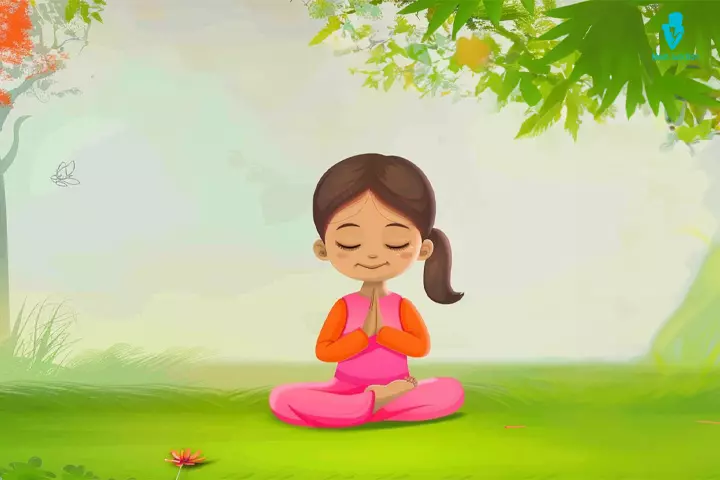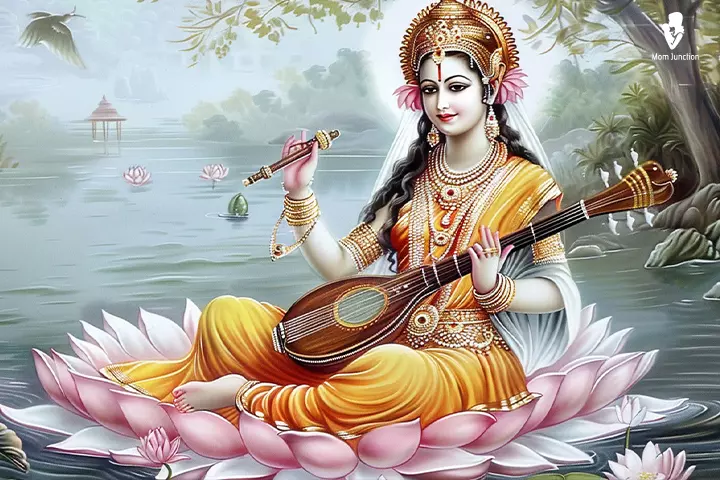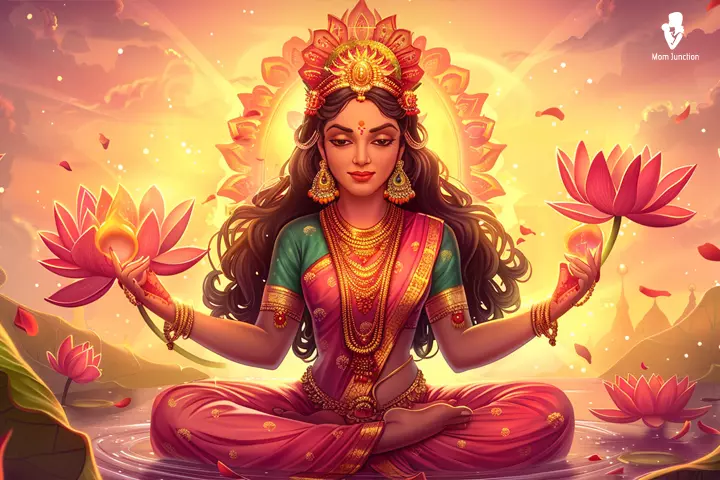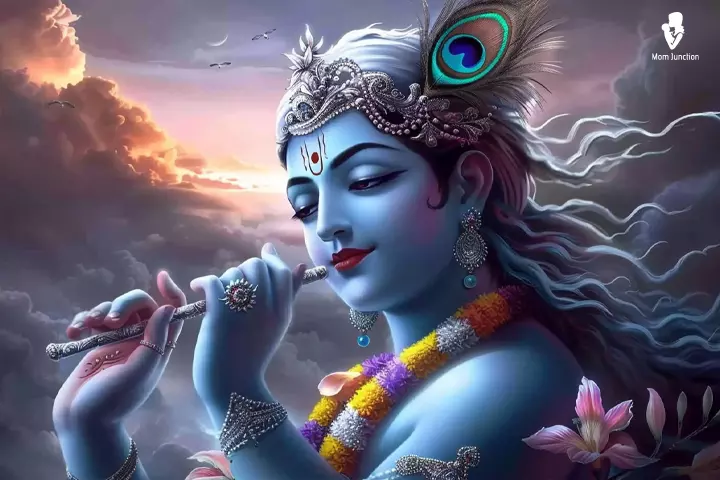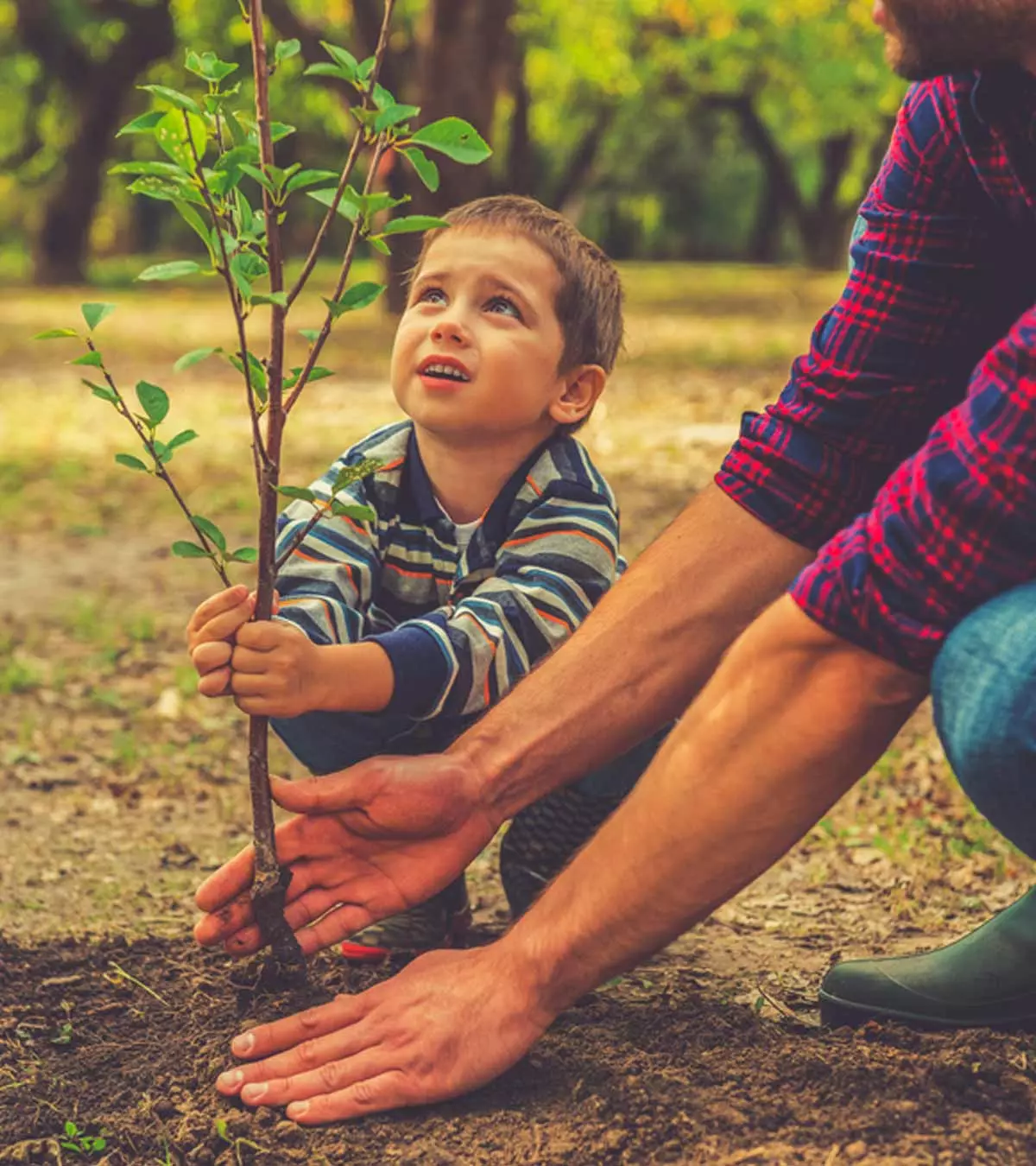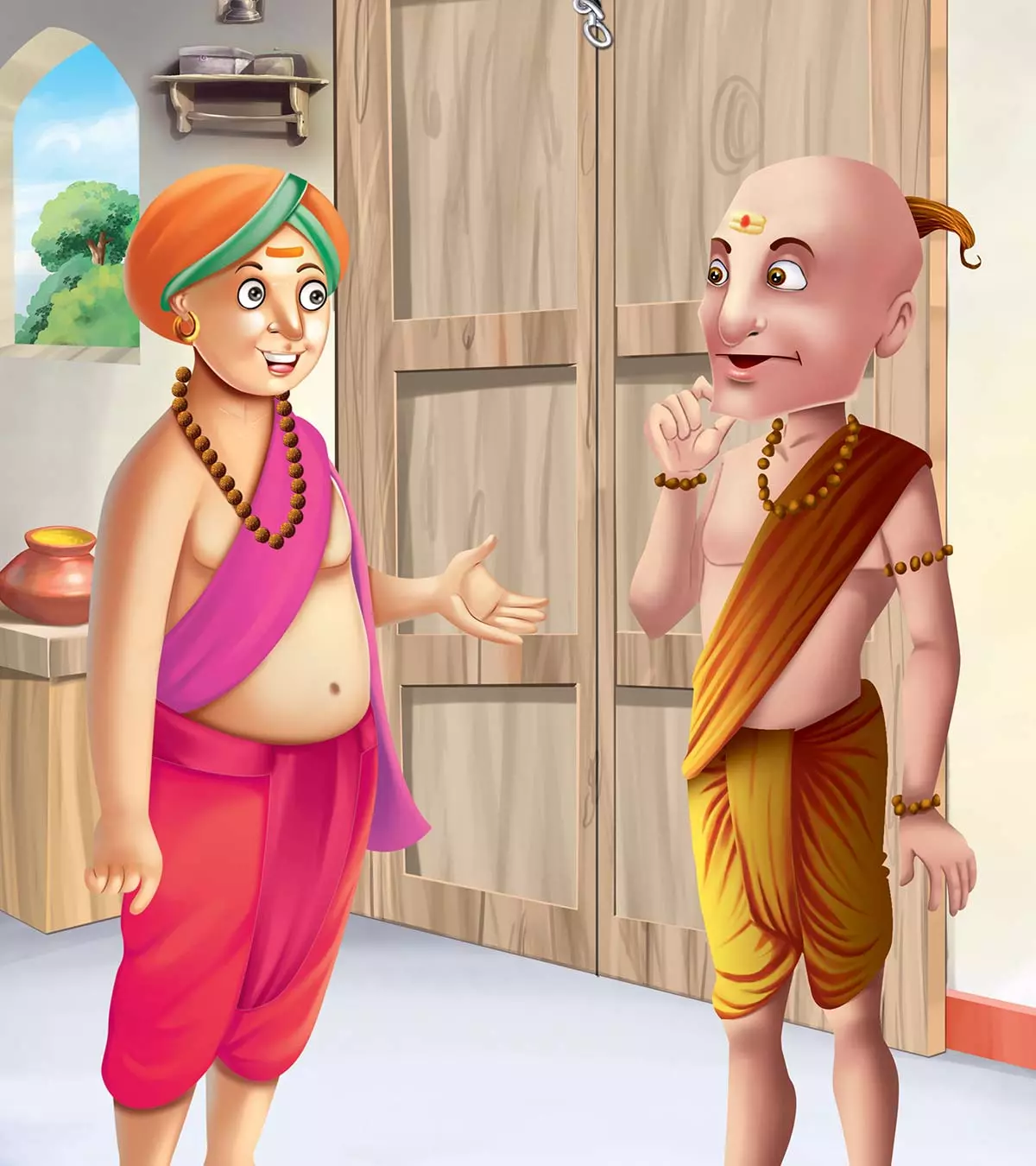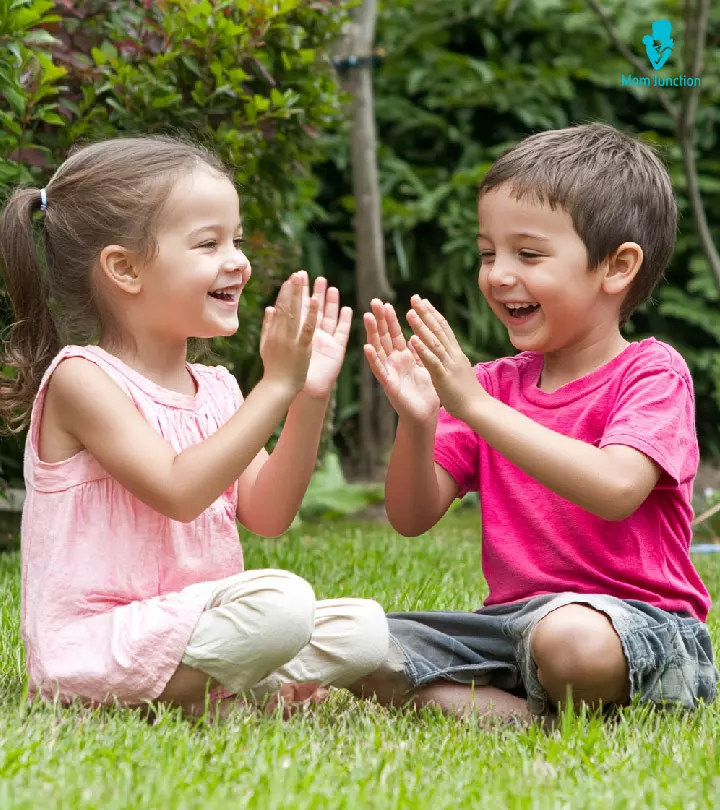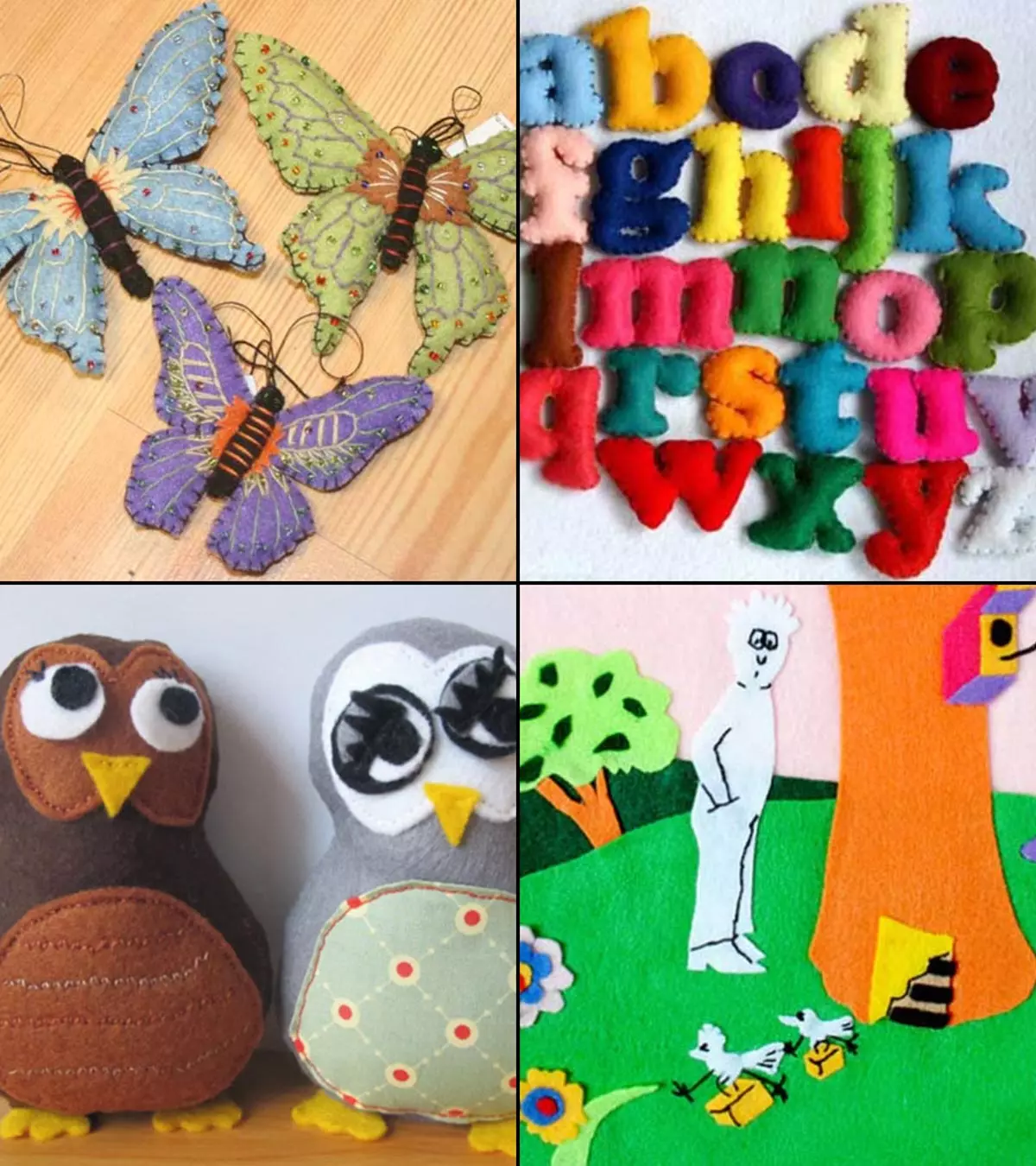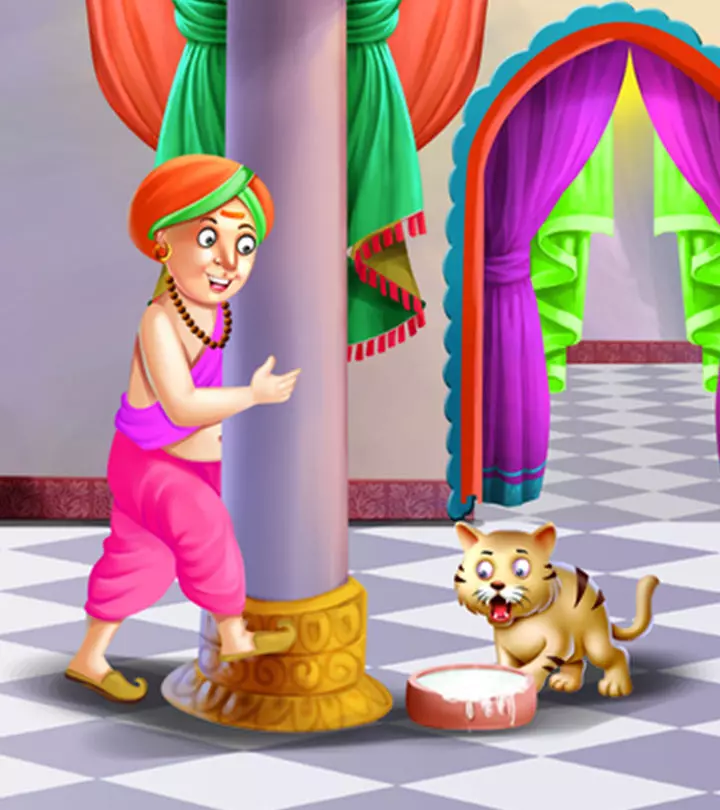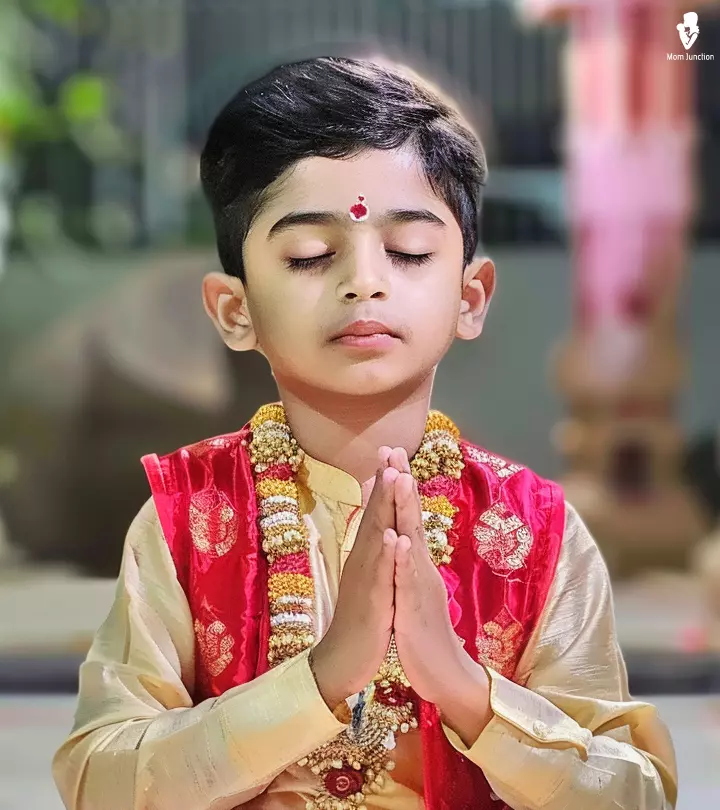

Image: Midjourney/ MomJunction Design Team
Slokas help create a positive environment by calming us down and releasing stress and anxiety.

You may introduce slokas for kids as reciting them can improve their concentration during a competition, exam, or a normal day. It can keep them refreshed and focused. Guiding your children to recite slokas every day is a good habit to teach right from childhood as it can benefit them even when they are grown up. So scroll through our post for the most relevant and common Sanskrit slokas.
Key Pointers
- Sanskrit slokas are powerful verses that can create an environment of positive energy if recited regularly.
- They can help children overcome daily anxiety and stress.
- They teach children to express gratitude to the Almighty and seek blessings.
- They often contain moral teachings that help children imbibe various virtues.
Benefits Of Reciting Slokas For Children
The Sanskrit word sloka is derived from the root ‘sru’ and means ‘song’ or ‘verse.’ Usually consisting of two lines, these verses are often introduced to children from a young age to help them develop good values. Additionally, they offer children a deeper understanding of their heritage and the diversity of world cultures.
According to Hindu scriptures, chanting slokas can help:
- Enhance memory and concentration
- Improve linguistic skills and support language development
- Regulate breathing and promote healing
- Foster a sense of peace and emotional stability
- Reduce stress and boost mental health
- Develop self-control
Slokas are an inseparable part of the Hindu culture. From epics like Mahabharata and Ramayana to the most sacred Bhagavad Gita, many Hindu scriptures and texts are composed in the form of slokas. Hence, it can be said that slokas aren’t plain verses, rather they are the means of memorizing and reciting sacred knowledge.
19 Meaningful Slokas for Children to Learn and Recite
These slokas for kids are not only easy to chant and learn but also have a profound meaning to them. They teach us an essential life lesson.
1. Gayatri Mantra
Also called the Maha Mantra or the Savitri Mantra, this sloka is the most revered mantra, and is dedicated to the Sun. It can be recited as a morning prayer for kids. Make the child recite this out under the sun in the morning to refresh their mind and also get some Vitamin D.
Om bhur bhuva swaha
Tat savitur varenyam
Bhargo devasya dhimahi
Dhiyo yo nah prachodayat
Meaning: O God, the Savior, you are the basis of all life, self-existent, and whose touch sets every soul free from the sufferings, who penetrates into the universe and sustains every being, the creator of the whole universe, and who blesses with happiness.
Lord, the purest form and the purifier of this universe, may he enlighten our minds and inspire our intelligence (1).
 Quick fact
Quick fact2. Shanti Mantra
Here are the four Santhi mantras that your child may chant. Also known as the ‘teaching mantra,’ this sloka can be a suitable prayer for children at school as it helps to unite the teacher and students under divine protection.
Om Sahana Vavatu Sahanau Bhunaktu
Sahaveeryam Karavavahai
Tejas Vinavati Tamastu ma vidhwishavahai
Om Shanti Shanti Shantihi
Meaning: May the Almighty protect student and teacher and nourish the both of us together.
May the student and teacher work in sync with intensity and our learning be efficient and impressive. And may there be no enmity between us. May there be peace for all (2).
3. Shanti Mantra
Om sarveshaam swastir bhavatu
Sarveshaam shantir bhavatu
Sarveshaam poornam bhavatu
Sarveshaam mangalam bhavatu
Sarve bhavantu sukhinah
Sarve santu niraamayaah
Sarve bhadraani pashyantu
Maakaschit duhkha bhaag bhavet
Meaning: May auspiciousness, peace, fullness and prosperity be unto all, may all be happy and free from disabilities, may all look to the good of others, and may none suffer from sorrow (2).
4. Shanti Mantra
Asatoma sad gamaya
Tamaso ma jyotir gamaya
Mrityor ma amritam gamaya
Om shanti, shanti, shanti hi
Meaning: Oh Lord, lead us from the unreal to real, darkness to the light and from death to immortality. May peace be with all (2).
5. Shanti Mantra
Om poornamadah poornamidam
Poornaat poornamudachyate
Poornasya poornamaadaya
Poornamevaavashishyate
Om shanti, shanti, shanti hi
Meaning: That is the ultimate truth, the God. This is the absolute. Absolute rises above the absolute. Even when the absolute is taken out of the absolute, it still remains (2).
6. Guru Mantra
The sloka is a salutation to the teacher, equating them to the Hindu Trinity.
Gurur brahmah gurur vishnu
Gurur devo maheshwaraha
Gurur saakshaat param brahmah
Tasmai shree guravey namaha
Meaning: The teacher is equal to Brahma and Vishnu. The teacher is Maheshwara. The guru is equivalent to the Almighty (3).
7. Guravey Sarva
This is for saluting Dakshinaamoorthy (Lord Shiva is also called so as he did penance facing the South).
Guravey sarva lokaanaam
Bishajey bhava rohinaam
Nidhaye sarva vidyanaam
Shree dakshinaa moorthaye namaha
Meaning: We bow down to the God of South (the universal guru) who is the teacher to the entire world and curer of all the diseases in the world (4).
 Did you know?
Did you know?8. Vidyaarthee Sloka
Bow to Lord Ganesha with this sloka.
Vidyaarthee lapathey vidyaam
Dhanaarthee lapathey dhanam
Puthraarthee lapathey puthraan
Mokshaarthee lapathey gathim
Meaning: Aspire for knowledge, you’ll get it; yearn for wealth, you’ll get it; ask for a child, you’ll get it; and strive for salvation, and you’ll reach it.
9. Vakrathunda Sloka
The sloka is about seeking Lord Ganesha’s blessings for removing any obstacles on your path to success.
Vakrathunda mahaakaaya
Suryakoti samaprabha
Nirvignam kurumey deva
Sarvakaryeshu sarvada
Meaning: O Lord with a curved trunk and huge body, and the brilliance of a million suns, I seek your blessings to grace my new beginning and remove all the obstacles as I begin to work (5).
10. Yaa Kundendu
Pray to the Goddess of Knowledge, Saraswati, before you begin your lessons every day.
Yaa kundendu tushaarahaara dhavalaa
Yaa shubhra vastraavritaa
Yaa veenaa varadanda manditakaraa
Yaa shveta padmaasanaa
Yaa brahmaachyuta shankara
Prabhritibihi devaih sadaa pujitaa
Saa maam pattu saravatee
Bhagavatee nihshesha jaadyaapahaa
Meaning: Goddess Saraswati is white like the moonlight, snow, and the pearl and is adorned in pure ivory white. Whilst she plays the veena with her two hands, she gives blessings with the other two hands or punishments when required. She is sitting on a beautiful white lotus. Goddess Saraswati is worshipped by all the divine lords Brahma, the creator, Vishnu, the preserver and Maheshwara, the destroyer. May Goddess Saraswati remove any obstacles from my life and shelter me (6).
11. Sarva Kalyaani Mantra
A prayer to the Goddess for success and prosperity.
Sarva mangala mangalye shive sarvaartha saadhike
Sharanye trayambake Gauri Narayani namosthute
Meaning: O Goddess of all auspiciousness, who is so harmonious, the fulfiller of our objectives, the giver of refuge, who has three eyes and is in golden color, our salutations to you, Gauri Narayani (7).
12. Saraswati namastubhyam
Pray to the Goddess of Knowledge and seek her blessings for attaining wisdom.
Saraswati namastubhyam varade kaamaruupini
Vidyaarambham karishhyaami siddhirbhavatu me sadaa
Meaning: My salutations to Goddess Saraswati. You bless and fulfill all our aspirations. As I am beginning my path to wisdom, I seek your blessings. May I accomplish my goals (8).
13. Hyagreevam Stuthi
Hayagreeva is an incarnation of Lord Vishnu. Children may recite this sloka before beginning their day at school.
Gyaananandamayam devam
Nirmala spadikakruthim
Aadaram sarva vidyanaam
Hyagreevam upasmahe
Meaning: Salutations to Sri Hayagreeva, the Lord with a Horse face. You are the presiding God for all the knowledge in the world. We offer our prayers to you; please bless us with knowledge and wisdom (9).
14. Deepam Sloka
This sloka is a prayer to the lamp.
Shubham karoti kalyaanam
Aarogyam dhana sampadaa
Shatrubudhi vinaashaaya
Diipajyoti namoastute
Meaning: The one who is our light, which brings auspiciousness, prosperity, sound health, abundant wealth, and destroys the intellect’s enemy, our salutations to you (10).
15. Lakshmi Sloka
This prayer is to seek the blessings of the Goddess of wealth Lakshmi during aarthis or Puja.
Namastestu mahamaye
Sripithe sura pujite,
Sankha chakra gada haste
Mahalaksmi namostute
Meaning: Salute to Mahalakshmi, who is the Cause of Creation, and who is worshiped by the Suras. Salute to the goddess who is adorned with the conch, disc and mace in her hands. I respectfully bow in front of you (11).
 Did you know?
Did you know?16. Sastha Dasakam
Here is a devotional prayer to Ayyappa, the lord of Sabarimala.
Mattha mathanga gamanam
Karunyamrutha pooritham
Sarva vigna haram devam
Sastharam pranamamyaham
Meaning: Salutations to Lord Ayyappa, who gallops like an elephant, is filled with immense compassion, and is the destroyer of hurdles (12).
17. Bhoothanatha Sloka
Bhoothanatha sadananda
Sarva bhootha daya para
Raksha raksha maha baho
Sasthre thubham namo nama
Meaning: Salutations to Sastha devataa, robust like an elephant and who is ever happy and is filled with mercy for all beings in this universe, the God who removes all obstacles (12).
18. Shiva Mantra (Mahamrityunjay Mantra)
A powerful mantra that instills strength and courage in times of fear and weakness.
Om Tryambakam Yajamahe
Sugandhim Pushti Vardhanam
Urvarukamiva Bandhanan
Mrityor Mukshiya Maamritat
Meaning: We worship the three-eyed Lord Shiva, who is fragrant and nourishes all life. Let me be liberated from death (all earthly attachments), as I am bound to live like cucumbers to creepers. Let me not be separated from the perception of Immortality (13).
19. Hare Krishna Mantra
A mesmerizing mantra singing praises to the Bhagavan, who removes negative emotions and relieves fear and anxiety.
Hare Krishna Hare Krishna
Krishna Krishna Hare Hare
Hare Rama Hare Rama
Rama Rama, Hare Hare
Meaning: Through this mantra, we praise the two incarnations (avatars) of Lord Vishnu, namely Lord Krishna and Lord Rama. It is a call to the universal energy that is thought to be the source of all powers (14).
Effective Tips To Teach Slokas To Children
Slokas are written and recited in Sanskrit. Hence, children need to have a fundamental knowledge of the Sanskrit alphabet and grammar. Here are some additional tips on how you can teach slokas to children:
- Start with simple slokas: Some slokas are simpler to chant than others. Choose simple slokas such as Gayatri Mantra or Hare Rama Hare Krishna and then proceed on to more complex ones. You can add visual aids, such as pictures and illustrations related to the slokas to make learning more engaging and fun.
- Add the element of music: Children can pick up slokas with relative ease if they listen to them constantly. Play the slokas you want your child to learn and instruct them to practice recitation with audio played in the background. You can set the slokas to music or rhythm, as children often find it easier to memorize content with a musical element.
- Teach the meaning: Instead of simply asking your child to rote-learn a sloka, explain its meaning to them. You can divide slokas into smaller parts and teach each part separately with distinct meanings. It will help children learn the sloka faster and reduce mispronunciations.
- Take one line at a time: Even though a sloka consists of only two lines, its complex Sanskrit words may seem difficult for your child to understand and pronounce. So, teach your child the first line or even the first couple of words and move on to the next part only after they master the previous part.
- Set a routine: Make slokas a part of your daily prayers. Daily chanting will enable your child to learn the slokas quickly. Recite the slokas multiple times each day and instruct your child to repeat them with you.
- Be patient and persevering: Slokas are written in Sanskrit and often prove challenging to memorize and pronounce even for adults. So, show patience towards your child as they learn new slokas and gently correct them when they are wrong.
Etiquettes For Children While Chanting Slokas
Chanting slokas carries religious and cultural significance. Adhering to etiquette when chanting slokas can make the overall experience more rewarding.
- Stay clean: Cleanliness is considered important in many cultures. So ensure that your hands, feet, and face are clean. Additionally, wear clean clothes before you sit for the sloka recitation.
- Maintain respectful posture: Sit or stand with your back straight and hands clasped together or resting on the lap. Maintaining a comfortable yet respectful posture is vital to stay focused and honor customs.
- Stay calm: Sit for shloka recitation in a calm and distraction-free environment. It will help you stay focused and mindful.
- Emphasize pronunciation: Learn and practice the pronunciation of shlokas. Remember, every word in a sloka has a deep meaning. Hence, proper pronunciation is essential to be respectful of traditions.
- Practice gratitude: Say a prayer to the divine at the beginning and the end of sloka recitation session as a token of gratitude to the Almighty.
Frequently Asked Questions
1. How do I get my child to learn slokas?
Slokas can promote calmness and release stress in kids, contributing to their joyful disposition. First, explain the meaning of each verse and divide each line into two halves to make it easier for your child to memorize the slokas. Let them practice how to pronounce each word correctly. Gradually introduce chanting slokas to them. Your child can master slokas through regular practice.
2. What is the use of slokas for kids?
Slokas can help your child memorize and learn effectively. It also promotes cognitive abilities, strengthens concentration skills, improves focus, and boosts creativity. Also, a child’s stress levels can be effectively reduced and managed by learning and chanting slokas.
3. What do we call shloka in English?
In English, a shloka is referred to as a sacred verse or poetic stanza.
4. Can reciting slokas help calm down an agitated child?
Reciting slokas can help calm an agitated child by promoting a sense of serenity and focus through rhythmic chanting and spiritual resonance.
The Sanskrit slokas stated above are among the most popular and significant ones, including the Gayatri mantra, Shanti mantra, and teacher mantras, used to give praises to the higher power. These slokas for kids can help instill positive behavior and give them a valuable life lesson. So, if you’re starting to teach Sanskrit slokas, don’t bombard them with too much at once. You may start by using these slokas as morning or bedtime prayers for children. Also, make sure they know what each sloka means to appreciate what they’re saying. Start with the easiest ones and work your way up to the more
Immerse yourself in the spiritual realm with this enchanting video featuring mantras for daily prayers. Experience the power, lyrics, and profound meaning of these bhakti songs.
References
- Gayatri Mantra – A Universal Prayer.
https://www.sathyasai.org/devotional/gayatri - News From The Hindu Community And Cultural Center, Livermore.
https://livermoretemple.org/hints/images/PV/414200620162.pdf - The Guru Mantra: Meaning and Benefits.
https://powerofmantra.org/gurur-brahma-gurur-vishnu-gurur-devo-maheshwaraha-guru-saakshaat-parabrahma-tasmai-sri-guruve-namaha-1008-times/ - Stotra Chinthamani.
https://www.celextel.org/mantras-and-rituals/stotra-chinthamani/ - Vakratunda Mahakaya – In sanskrit with meaning.
https://greenmesg.org/stotras/ganesha/vakratunda_mahakaya.php - Sarvamangala Mangalye – In sanskrit with meaning.
https://greenmesg.org/stotras/durga/sarvamangala_mangalye.php - Saraswati Stotram – In sanskrit with meaning.
https://greenmesg.org/stotras/saraswati/saraswati_stotram.php - Saraswati Namastubhyam – In sanskrit with meaning.
https://greenmesg.org/stotras/saraswati/saraswati_namastubhyam.php - Jnananadamayam devam Nirmala spatikakrutim 1008 Hayagriva Mantra.
https://powerofmantra.org/jnananandamayam-devam-nirmala-sphatikakrutim-1008-times-hayagriva-mantra/ - Shubham Karoti Kalyanam – In sanskrit with meaning.
https://greenmesg.org/stotras/others/shubham_karoti_kalyanam.php - Mahalakshmi Ashtakam: Significance, lyrics & meaning.
https://www.artofliving.org/in-en/festivals/navratri/mahalakshmi-ashtakam - Sastha Dasakam.
https://www.srilakshmi.org/save.php?file=media/Forms/Sastha%20Dasakam.doc - Maha Mrityunjay Mantra Jaap.
https://www.trimbakeshwar.org/mahamritunjay-jaap - Hare Krishna Maha Mantra.
https://iskconmangalore.org/hare-krishna-maha-mantra/
Community Experiences
Join the conversation and become a part of our nurturing community! Share your stories, experiences, and insights to connect with fellow parents.
Read full bio of Harshita Makvana
Read full bio of Deepa Thomas
Read full bio of Reshmi Das


